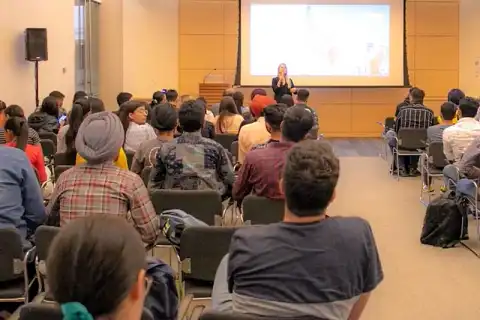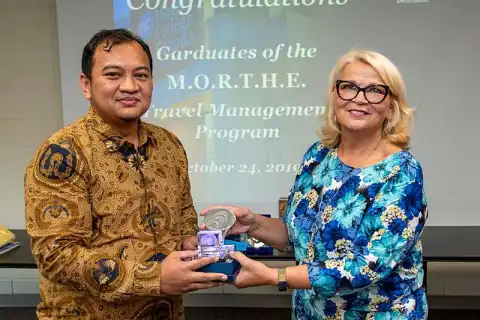Advanced Diploma - Business Administration (Accounting, co-op)
- 3 years
- Duration
- 54,724 CAD
- Price
- Rolling admission
- Start
- Rolling admission
- Deadline
- Diploma
- Degree
- Campus
- Format
- Niagara-on-the-Lake / Canada
- Location
Program description
Are you good with numbers and would like to work in a position where you oversee the money of your employer or clients?
You will be possessed the theoretical knowledge and abilities required for a profession in accounting or financial management in today's fast-paced economy as a graduate of Business Administration – Accounting (Co-op).
Highlights
- Through industry-related projects and a co-op work period, you can get practical experience.
- Experiential learning that is done by hand with the help of computer programs, case studies, and group projects.
- Professionally designated accounting faculty.
- Along with gaining the fundamental information required to advance to managerial positions, students also acquire the experience and proficiencies necessary for intermediate accounting roles.
Program structure
Term One
- Financial Accounting I
- Writing Strategies
- Mathematics of Finance
- Spreadsheet Applications
- Organizational Behaviour
- Equity, Diversity and Inclusion in Canada
Term Two
- Financial Accounting II
- Computer Applications
- Principles of Marketing
- Microeconomics
- Statistics I
Elective Information
- Completion of additional General Education elective 1 course required
Term Three
- Intermediate Accounting I
- Finance I
- Management Cost Accounting I
- Business Communications
- Macroeconomics
Elective Information
- Completion of additional General Education elective 1 course required
Term Four
- Accounting Applications
- Finance II
- Canadian Income Tax I
- Intermediate Accounting II
- Accounting Information Systems
- Canadian Business Law
Term Five (Co-Op)
- Co-op Work Term I
Term Six
- Ethics and Workplace Skills
- Canadian Income Tax II
- Intermediate Accounting III
- Management Cost Accounting II
- Advanced Excel and Data Analysis
- Project Management Fundamentals
Term Seven
- Auditing Fundamentals
- Accounting for Public and Not-for-Profit Entities
- Advanced Accounting
- Management Cost Accounting III
- The Entrepreneur
- Business Applications
Price
Level One
- Tuition — 7,575 CAD
- Ancillary Fees — 2,202 CAD
- Material Fees — 65 CAD
- Level Total — 9,843 CAD
Level Two
- Tuition — 7,575 CAD
- Ancillary Fees — 1,245 CAD
- Material Fees — 0 CAD
- Level Total — 8,817 CAD
Year One Total: 18,660 CAD
Level Three
- Tuition — 7,575 CAD
- Ancillary Fees — 1,921 CAD
- Material Fees — 0 CAD
- Level Total 9,496 CAD
Level Four
- Tuition — 7,575 CAD
- Ancillary Fees — 961 CAD
- Material Fees — 0 CAD
- Level Total — 8,536 CAD
Level Five
- Co-op/work terms have no tuition cost, however the co-op fee(s) in previous terms covers administration of this term.
Year Two Total: 18,032 CAD
Level Six
- Tuition — 7,575 CAD
- Ancillary Fees — 1,921 CAD
- Material Fees — 0 CAD
- Level Total — 9,496 CAD
Level Seven
- Tuition — 7,575 CAD
- Ancillary Fees — 961 CAD
- Material Fees — 0 CAD
- Level Total — 8,536 CAD
Year Three Total: 18,032 CAD
Estimated Program Total: 54,724 CAD
Requirements for applicants
Admission Requirements
- Ontario Secondary School Diploma (OSSD), or equivalent including the following required course(s):
- English – any Grade 12 (C) or (U), or equivalent
- Business or Accounting – any Grade 11 or 12 (M), (C) or (U) and Mathematics – any Grade 11 or 12 (M), (C) or (U) (these courses and skills may help you succeed academically in this program, but they are not required for admission)
Language Proficiency Admission Requirements
You will be required to provide proof of one or more of the following:
- Niagara College Mature Student Test for English
- Grade 12 English at the C or U level (Ontario High School Curriculum)
- ACE English (Academic Upgrading)
- International Credential Assessment for studies outside of Canada
If English is your subsequent language, Niagara College (for the purposes of admission to standard non-competitive programs) will also accept these English Language Test Scores
- Cambridge English Exams (B2 First/FCE, C1 Advanced/CAE or C2 Proficiency/CPE) - 169 – No skill under 162
- International English Language Testing System (IELTS) including Indicator Test** 6.0 – No individual band under 5.5.
- Duolingo Language Test - Overall score of 105+, with no individual score under 95
- Internet-based (IBT) Test of English as a Foreign Language (TOEFL) including Special Home Edition Test - Paper-based: 500, Computer based: 173, iBT: 79, Minimum: 20 Writing, 20 Speaking
- Pearson Test of English (PTE) - 46+, with no individual skill under 36
- Canadian Academic English Language Test (CAEL) including CAEL Online Proficiency Test - 60 – No individual band under 50.
- Niagara College’s English for Academic Preparation program (EAP) - Completion of Level 5 English for Academic Preparation (EAP) program with 70% and no individual grade under 50%
About the university

Niagara College, with campuses in Welland and Niagara-on-the-Lake, is conveniently located in the center of the Niagara Region, only minutes away from one of the world's most popular tourist destinations. The college is home to more than 130 cutting-edge academic programs.
All of our campuses are home to state-of-the-art facilities and innovative teaching methods, including small class sizes, cutting-edge research, and real-world application.
These courses put students in an interactive and technologically advanced learning environment. Our grads are well-versed in multiple cultures, quick learners, and risk takers who push the envelope of what's possible in business in Niagara, Canada, and beyond.
Why Niagara College?
- 130+ certificate, diploma, apprenticeship and Bachelor's Degree programs
- 600+ credit, vocational and general interest courses
- We care about you and want you to succeed - employers report high levels of satisfaction with the skills and knowledge possessed by NC graduates.
- Building a sustainable future
- More than seven thousand students per year participate in cooperative education, field placements, internships, learning enterprises, apprenticeships, clinical placements, course-based research, and fieldwork in about one hundred different academic disciplines.





